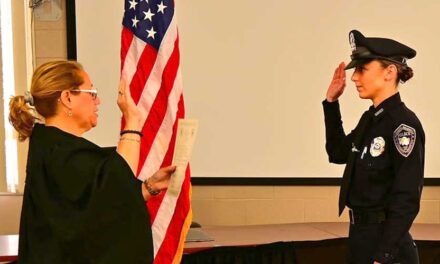Published in the October 27, 2016 edition
By BOB TUROSZ
NORTH READING — For over 50 years, North Reading has been a Civil Service community, in which Police Department hiring, promotions and other personnel decisions have been subject to Civil Service regulations.
That will come to an end in the near future as the result of a Town Meeting vote last week as a crowd of 123 residents voted unanimously to approve an article rescinding Civil Service for the police department.
The article was brought to Town Meeting as the result of contract agreement between the Board of Selectmen and the unions representing the department’s superior officers and patrolmen and sergeants.
“During the last contract negotiations this was mutually agreed upon as in the town’s and the department’s best interests,” said Selectman Stephen O’Leary. “We had substantial negotiations on this with the local unions and they stand with us.”
The Town Meeting action does not affect the town’s Fire Department, which remains under Civil Service.
By leaving Civil Service, the town will be allowed to conduct its own hiring and promotional and disciplinary appeals process without being subject to the intervention of the Civil Service Commission. North Reading voted to join Civil Service back in 1960 at a time when it was looked upon nationally as a mechanism of combating favoritism in government jobs, O’Leary said, but much has changed since then. Now, the Civil Service system is extremely slow, cumbersome and does not fit the town’s needs, O’Leary said.
Currently there are 156 Civil Service communities and 196 non–Civil Service communities in the state, O’Leary said. With the passage of this article, the Selectmen hope those number change by one either late this year or early next year. For that to happen, the state Legislature must approve a Home Rule petition that will be filed by State Rep. Brad Jones Jr. and Gov. Charlie Baker must sign the bill into law.
The way the system works now, said O’Leary, is that the Civil Service Commission handles all the initial hiring, all the promotions and discipline appeals for the town. “It’s state wide and one–size–fits–all. There’s no local control.”
The process begins with a state wide examination in April and the results don’t become available until October. When a community needs to hire a police officer, they petition the Civil Service Commission for a list of candidates.
This results in significant delays in the hiring process for new hires and promotions, O’Leary said. “If you have a vacancy you have to work from an existing list, which could be two years old or you have to wait several months until the new exam results come out.”
Other communities around here that have switched to non–Civil Service include Reading, Burlington and Needham.
Other disadvantages are that no community or department–specific criteria can be incorporated into promotional exams and the Civil Service Commission has historically been understaffed. Due to lack of staffing at the state level, the town’s responsibilities have increased substantially and currently the situation is the worst it’s been in decades, O’Leary said. There can also be manipulation by some applicants regarding residency and layoffs and layoffs from other communities go to the top of the list when it comes to hiring.
O’Leary also said there’s an over reliance on generic multiple choice examinations and a limited pool of candidates and “minimal” entrance or promotional standards.
The benefits of a community–based system for hiring and promotions are that the hiring process can be specific to North Reading’s needs, with its own examination that can be scored in a week. The town can consider a broader pool of candidates with increased entrance and promotional exams and exams held as often as needed, he said. In addition, the timing of the hiring process can be based on the town’s staffing needs and overall goals and there will be the ability to require higher educational levels than Civil Service.
Questions from the voters were mostly procedural concerning the timeline, how it would be submitted to the legislature, etc. There was no protracted debate and the article passed swiftly.




